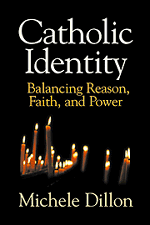Book contents
- Frontmatter
- Contents
- Acknowledgments
- 1 Pro-Change Catholics: Forging Community out of Diversity
- 2 Doctrinal Change in the Catholic Church
- 3 Official Church Teaching on Homosexuality, Women's Ordination, Abortion, and the Role of the Theologian
- 4 Pro-Change Groups in the Contemporary Church: Dignity, the Women's Ordination Conference, and Catholics for a Free Choice
- 5 Gay and Lesbian Catholics: “Owning the Identity Differently”
- 6 Using Doctrine to Critique Doctrine
- 7 Pluralism in Community
- 8 Reasoned Theology: Legitimating Emancipatory Possibilities
- 9 Catholic Options
- Appendix: Research Methodology
- References
- Index
8 - Reasoned Theology: Legitimating Emancipatory Possibilities
Published online by Cambridge University Press: 04 August 2010
- Frontmatter
- Contents
- Acknowledgments
- 1 Pro-Change Catholics: Forging Community out of Diversity
- 2 Doctrinal Change in the Catholic Church
- 3 Official Church Teaching on Homosexuality, Women's Ordination, Abortion, and the Role of the Theologian
- 4 Pro-Change Groups in the Contemporary Church: Dignity, the Women's Ordination Conference, and Catholics for a Free Choice
- 5 Gay and Lesbian Catholics: “Owning the Identity Differently”
- 6 Using Doctrine to Critique Doctrine
- 7 Pluralism in Community
- 8 Reasoned Theology: Legitimating Emancipatory Possibilities
- 9 Catholic Options
- Appendix: Research Methodology
- References
- Index
Summary
The preceding three chapters have focused on pro-change Catholics whose activism within the church seeks the institutional affirmation of the differences that comprise Catholic communality. The community practices of Dignity/Boston, the arguments presented by WOC and CFFC respondents, and the internal pluralism evident among prochange respondents themselves underscore the challenge posed to the church hierarchy's attempt to demarcate a universal and uniform Catholic identity. At the same time, pro-change Catholics demonstrate their commitment to maintaining their connection with Catholicism, and rather than fracturing the tradition, seek a greater integrity between its doctrinal values and institutional practices. Since interpretive authority and the doctrinal possibilities of Catholicism are central concerns of this study, I also include interviews with Catholic theologians. Theologians are interesting for two reasons. As professional experts committed to the understanding of faith, they are steeped in and have a deep knowledge of the Catholic tradition. At the same time, despite their formal institutional status in the church as interpreters of the faith, they are subordinate to the church hierarchy.
In the Vatican's understanding of the church as a divinely prescribed hierarchical institution wherein magisterial authority is supreme, the task of the theologian is seen as elaborating official church teaching rather than being autonomous of it. Thus the doctrinal interpretations theologians offer based on appeals to disciplinary knowledge must, if the case arises, defer to alternative interpretations supported by the authority of sacred office.
- Type
- Chapter
- Information
- Catholic IdentityBalancing Reason, Faith, and Power, pp. 221 - 241Publisher: Cambridge University PressPrint publication year: 1999



